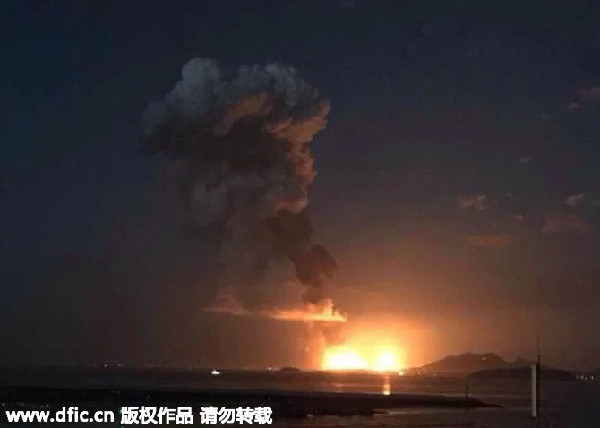Proper probe into blast can raise plant safety
Updated: 2015-04-08 07:41
(China Daily)
|
|||||||||||
 |
|
Black smoke rises from the fire caused by blasts at a paraxylene (PX) chemical plant, injuring at least 14 people, in Zhangzhou city, Southeast China's Fujian province, April 6, 2015. [Photo/IC] |
The damage caused by the explosion in a chemical plant producing paraxylene on Monday will not be to just the plant's productivity and the local environment. It will also increase people's aversion to such projects.
This is the second explosion at the plant in Zhangzhou, East China's Fujian province, since it opened in 2009. The first in 2013 was caused by a crack in a hydrogen pipe because of a welding defect. And investigators suspect the cause of Monday's blast was an oil leak in one of the facilities.
The fact that the increasing pollution in many of China's waterways, including major ones such as the Yangtze and Huaihe rivers, has a lot to do with the discharge of pollutants and wastes from chemical plants has made Chinese people distrustful of chemical projects.
Despite the reiteration by chemical experts about the safety of paraxylene projects and the fact that there has not been a single toxic gas leak from such plants worldwide in recent decades, it is still hard to convince the majority of residents that such projects pose hardly any environmental threat.
True, the majority of residents suspicious about the safety of a chemical project in all likelihood do not have proper knowledge about what paraxylene is and how important it can be for the production of polyester and many other plastics we use in our daily lives.
Yet two explosions in the same paraxylene plant in less than two years suggest that poor management and construction defects could prove disastrous for properties, the environment and people's lives. Anything, from oil or gas leaks to cracks in pipes, could lead to accidents even though such chemical projects are theoretically safe.
China is badly in need of paraxylene for the production of plastic. It is indeed necessary for it to be produced at home, as, at present, it has to import more than 50 percent of its needs.
That tells why this accident needs to be handled with the utmost responsibility, so that those responsible are penalized, all the loopholes are plugged and all the necessary lessons are learned.
The accident should serve as a warning for other chemical plants to tighten their safety controls. The safety standards and rules on industrial processing should be observed closely with vigilant and effective supervision.
Precautions should also be prepared in detail because chemicals are combustible products worthy of particular attention, which was proven when fire broke out again Tuesday night before being extinguished.
Only when all chemical plants operate in a safe manner will it be possible to relieve people of their worries.
Related Stories
Photos: chemical explosion in Zhangzhou 2015-04-07 17:05
Focus shifts to cause of NYC explosion after 2 bodies found 2015-03-30 14:55
3 buildings collapse after explosion 2015-03-28 08:12
Explosion kills 2, injures 7 at construction site 2015-03-17 15:58
Today's Top News
Cause of China chemical plant blast identified
Fleeing war-torn Yemen, Chinese, foreign nationals share the same boat
Liu Xiang expected to announce retirement on Tuesday
Toilet revolution for tourism evolution: Opinion
Joint statement finalized at Iran nuclear talks
British PM joins in seven-party pre-election TV debate
China's ex-security chief Zhou Yongkang faces raft of charges
Death toll rises to 147 in Kenya university attack
Hot Topics
Lunar probe , China growth forecasts, Emission rules get tougher, China seen through 'colored lens', International board,
Editor's Picks

|

|

|

|

|

|






